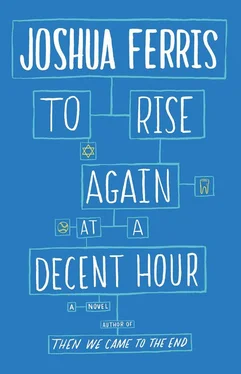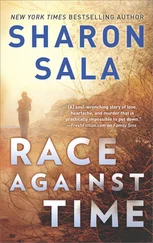“I already told you,” she said when I confronted her. “It wasn’t me. Do you think I would lie to you?”
“I don’t know what to think, Betsy. First I find somebody’s gone against my express wishes and made a website for my practice, and then I find a bunch of biblical gobbledygook on my bio page. And you’re somebody who knows the Bible.”
“Oh, for heaven’s sake, that doesn’t mean I know how to make a website.”
“I’m not suggesting you made it personally.”
“I did not make that website any way at all,” she said. “I am not responsible for it, and I did not put quotes from the Bible on it. And if I had, that’s certainly not the passage I would have chosen.”
“What passage is it?” I asked.
She looked again at the iPad. Whenever Mrs. Convoy read something to herself, the small contracted hairs around her pursed lips went wiggling up and down with the consumption of every word, as if she were a caterpillar working through a leaf.
“ ‘If thou makest of me a God,’ ” she said, reading aloud the last bit slowly, “ ‘and worship me, and send for the psaltery and the tabret to prophesy of my intentions, and make war, then ye shall be consumed.’ I don’t think Jesus ever said anything like that,” she said.
“So where’s it from?”
“The Old Testament would be my guess,” she said. “It’s a very stern, Jewish thing to say.”
She handed the iPad back to me.
“Maybe you should talk to Connie,” she said.
I would be less annoyed to be portrayed as a Jew online than a Christian. Still annoyed, because I was not Jewish, but it would be better somehow. You could be a nonpracticing Jew, and while I was not a nonpracticing Jew, because I had not been born a Jew and converting to Judaism just to persist in nonpractice would have been pointless, I could not be a nonpracticing Christian in any respect. You either believed or did not believe in Christ the Savior and all His many miracles and prophesies. It was ironic, I thought, to talk about “practicing” Christians when, to be a Christian, you didn’t have to do much of anything at all, you just had to profess your faith, while Jewish people, even nonbelieving ones, did more in a single Seder than a full-bore Christian obedient in his pew might do all year. Whether you were born a Christian or a Jew seemed tantamount to the same thing from the perspective of the newborn, but growing up made all the difference in the world. A Christian could slough off his inherited Christianity and become an atheist or a Buddhist or a plain old vanilla nothing, but a Jewish person, for reasons beyond my understanding, would always be Jewish, e.g., an atheist Jew or a Jewish Buddhist. Some of the Jews I knew, like Connie, hated this primordial fact, but as a non-Jew, I had the luxury of envying the surrender to fate that it implied, the fixed identity and tribal affiliations — which is why I minded the slander of being Jewish online less than the outrageous and vile insult of being Christian.
I knew nothing about Judaism before Connie. Before Connie I didn’t even know if I could say the word “Jew.” It sounded very harsh to me, to my Gentile ears, maybe particularly inside my indisputably Gentile mouth. I was afraid that if someone Jewish heard me say it, they would hear a reinforcement of stereotypes, a renewal of all the old antagonisms and hate. It was a minor but significant legacy of the Holocaust that non-Jewish Americans born long after World War II with little knowledge of Judaism or the Jewish people had a fear of offending by saying the word “Jew.”
My interactions with Jewish people before Connie were limited to looking inside their mouths. A Jewish person’s mouth is identical in every way to a Christian’s. It was all one big mouth to me — one big open, straining, gleeking, unhappy, discomfited, slowly decaying mouth. It was all the same cavity, the same inflammation, the same root infection, the same nerve pain, the same complaint, the same failure, the same fate. Look, here’s what I knew, all I cared to know, and for that matter, all I thought I’d ever need to know, about the Jews: they’d given the world a son, a southpaw by the name of Sandy Koufax, who pitched three Cy Young seasons for the Dodgers and hated the Yankees like a true American hero.
Connie came from a family of Conservative Jews, and to my surprise I found I liked attending the High Holidays, participating in the atonement, and even sitting through the absurdly long services, because they weren’t played out for me. They were plenty played out for Connie, who was no longer an active Jew and felt pretty much as I did on the subject of religion, even if she could not yet bring herself to say, “I do not believe in God.” Not on account of a superstition, or some vestigial faith, but rather a quibble with definitive statements. She preferred to call herself a nonpracticing atheist. This, she thought, would not totally close out the religious impulses that a poem sometimes demanded.
She was an interesting contrast to Sam Santacroce, who thought that Catholicism was tops and that her family dwelled in a three-dimensional holiday card of matching sweaters and Titleist health. Although years had passed since I’d been disabused of Santacroce nuclear perfection, having discovered, beneath a Huxtable veneer, their cynicism, venality, and prejudice, I still regarded Sam’s open love for her family as a demonstration of remarkable poise. I wanted us all to have such unchecked hearts. I wanted it for Connie above all, because her family, I thought, might actually deserve it. But she hesitated. The traditions were dull. Her family was nuts. And there was so much God. Wouldn’t the God stuff get to me?
The God stuff did not get to me because it had nothing to do with a guy on a cross. The God of the Jews and His effect on His people were blessedly free of punishment and priggishness, the Savior and His rising from the dead on the third day, the Eucharist, the logical contortions brought about by the Trinity, a long history of bloodshed and torture, looming threats of damnation, sexual prudery and guilt, stubbornly persisting Puritan mores, smugness and the foreclosure of curiosity, and, above all, the warrior mind-set ready to kill for Christmas trees and the Ten Commandments. In place of all that, the Plotzes had prayers and songs whose dogmas were disguised by the Hebrew they were sung in; rituals and traditions with a provenance of thousands of years and a persistence against great odds; heated debate at the Sabbath table; distant relatives as at ease with one another as the closest of siblings; debates in which bits of food flew from impassioned mouths; deeply learned references casually tossed into the conversation; and, at the end of the night, a parting so spirited it alone might leave you hoarse. I had no problem with any of it, and that was the problem.
Connie never gave me reason to break and enter or masturbate in a stranger’s closet or call her mother, as I had once called Samantha Santacroce’s mother, and make desperate, cryptic remarks like “The voices… the voices.” Connie returned my love as no one who had cunt gripped me ever had, and while that came with its own problems — namely, my suspicion that for the sake of love she was muting her true self as effectively as I was mine and that a day of reckoning awaited us — I was able to act more or less like a self-respecting adult aware of personal boundaries and in possession of his mind. I did not fall in love with Rachel and Howard Plotz as I had fallen in love with Bob and Barbara Santacroce or with Roy Belisle and his arm veins before them. I behaved. But for a while I was in danger of becoming a little too fixated on Connie’s entire extended family, and the feeling was not dissimilar to the one I had had in the company of the Belisles and the Santacroces: the ingratiating, slightly unhinged desire to belong to them, to be one of the family, to fit in with self-assurance, to reach without apology across the table for a baby carrot or a potato chip, to sprawl out upon their carpeted floors and speak my mind (which would accord perfectly with their innermost thoughts), to initiate hugs readily returned, and to hear, from the doorway, at the end of the night, “We love you, Paul.” It was really that “we” I wanted more than anything else. For all my proud assertions of self, I really only wanted to be smothered in the embrace of an inclusive and coercive singular “we.” I wanted to be sucked up, subsumed into something greater, historical, eternal. One of the unit. One with the clan. Connie’s extended family was the very essence of such a “we.” It had a central core — her mother, father, a brother and two sisters — and then offshoots and branchings of uncles, aunts, cousins, second cousins, nieces, nephews, grandparents, and great-uncles and — aunts: a family like none I’d ever known. Inside that sprawling mass of humanity hummed a tightly coiled heart of unified purpose whose signal achievement, it seemed to me, was a defense against loss. There were deaths, of course, and apostates among the young who acted out, smoked pot, and disliked being Jewish. But those were exceptions. Most of the time they took good care of each other. They kibitzed and gossiped and worried over this one and that, rescued one another from trouble, and of course gathered together, come hell or high water, for Bar and Bat Mitzvahs, wedding anniversaries, important birthdays, Passover, and the High Holidays.
Читать дальше












